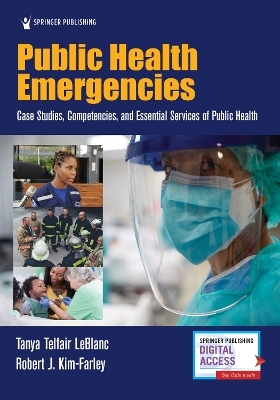
Public Health Emergencies
Springer Publishing Co Inc (Verlag)
978-0-8261-4902-2 (ISBN)
"This is a clearly written, easy-to-read first edition on a necessary subject in an ever-changing world of disaster and humanitarian crisis...Not only theoretical, this book is also extremely practical and can be utilized by the various stakeholders involved in public health and emergency response. This book should sit on the shelf of every public health department and be made available for frontline workers and policymakers alike." --Doody's Review Service, 3 stars
Public Health Emergencies provides a current overview of public health emergency preparedness and response principles with case studies highlighting lessons learned from recent natural and man-made disasters and emergencies. Designed for graduate and advanced undergraduate public health students, this book utilizes the 10 essential services of public health as performance standards and foundational competencies from the Council on Education for Public Health to assess public health systems. It emphasizes the roles and responsibilities of public health careers in state and local health departments as well as other institutions and clarifies their importance during health-related emergencies in the community. Written by prominent experts, including health professionals and leaders on the frontlines, this textbook provides the framework and lessons for understanding the public health implications of disasters, emergencies, and other catastrophic events, stressing applied understanding for students interested in pursuing public health preparedness roles.
Practical in its approach, Part One begins with an introduction to the fundamentals of public health emergency preparedness with chapters on community readiness, all-hazards preparedness design, disaster risk assessments, and emergency operation plans. Part Two covers a range of public health emergency events, including hurricanes, tornadoes, earthquakes, disease outbreaks and pandemics, accidents and chemical contamination, nuclear and radiological hazards, extreme heat events, and water supply hazards. The final part addresses special considerations, such as how the law serves as a foundation to public health actions; preparedness considerations for persons with disabilities, access, and functional needs; children and disasters; and a chapter evaluating emerging and evolving threats. Throughout, chapters convey the roles of front-line, supervisory, and leadership personnel of the many stakeholders involved in preparedness, response, and recovery efforts to demonstrate decision-making in action.
Key Features:
Provides the fundamentals of public health emergency preparedness and response with detailed case studies of recent natural and man-made disasters
Explains the roles of administrators, planners, first responders, and other stakeholders involved in emergency response
Covers major disaster planning and preparedness topics such as weather-related emergencies, bioterrorism, infectious disease outbreaks including COVID-19, wildfires, radiological and nuclear exposure, and many more
Crosswalks the 10 essential public health services and foundational public health competencies illustrated in case examples
Purchase includes digital access for use on most mobile devices or computers
Tanya Telfair LeBlanc, PhD, MS (formerly Tanya Telfair Sharpe) is a Senior Health Scientist with the Centers for Disease Control and Prevention. Robert J. Kim-Farley, MD, MPH is a Professor at the UCLA Fielding School of Public Health.
Introduction: Essential Public Health Services and Foundational Competencies for Public Health Emergencies by Robert J. Kim-Farley
Part I. Fundamentals of Public Health Emergency Preparedness
Chapter 1. What is Emergency Preparedness? by Tanya Telfair LeBlanc
Chapter 2. Community Preparedness: A Challenge for the Ages by Tanya Telfair LeBlanc
Chapter 3. All-Hazards Preparedness Design: A Systems Approach by Glen P. Mays
Chapter 4. Disaster Risk Assessment: A Primer by Kimberley Shoaf
Chapter 5. Emergency Operations Plans: Essential Tools for Preparedness and Response by Glen P. Mays
Part II. Lessons Learned from Actual Incidents
Chapter 6. Hurricane Disasters as a Public Health Problem: The Hurricane Harvey Disaster in Texas by J. Danielle Sharpe and David S. Rickless
Chapter 7. Tornadoes and Related Public Health Risks: The Joplin Tornado Public Health Response by Zhen Cong, Zhirui Chen, and Aaron Hagedorn
Chapter 8. Earthquakes: Public Health and Medical Response--The California Model by Howard D. Backer
Chapter 9. Wildfires: Evaluating The Cardiorespiratory Health of Wildland Firefighters by Denise M. Gaughan, Mark D. Hoover, Christopher A. Kirby, and Stephen S. Leonard
Chapter 10. Extreme Heat Events and Public Health by Maryam Karimi, Rouzbeh Nazari, and Samain Sabrin
Chapter 11. Public Health Response to Bioterrorism: Lessons from the 2001 Anthrax Attacks as a Foundation by Alexander H. Chang, Allison P. Chen, and Edbert B. Hsu
Chapter 12: Chemical Disasters and Public Health Effects: The Bhopal Chemical Industrial Disaster by Alexander H. Chang, Allison P. Chen, and Edbert B. Hsu
Chapter 13. Nuclear Detonation as a Public Health Threat: A Case Approach for Preparedness by Robert M. Levin
Chapter 14. Disease Outbreaks and Pandemics: COVID-19 and Other Case Studies by Dawn Terashita, Moon Kim, and Sharon Balter
Chapter 15. Water Supply Hazards and Public Health: Drinking Water Cryptosporidium Response Plan by June E. Bancroft, Taylor S. Pinsent, Ann Levy, Jonathan S. Yoder, and John Person
Part III. Special Considerations
Chapter 16. Public Health Law: Foundations and Applications During Emergencies by Lauren T. Dunning, Jennifer L. Piatt, and James G. Hodge
Chapter 17. Access and Functional Needs: I am My Brother's Keeper by Tanya Telfair LeBlanc
Chapter 18. Children and Disasters by Nancy Blake and Catherine J. Goodhue
Chapter 19. Evolving and Emerging Threats by Esther D. Chernak
Chapter 20. Going Forward: Other Emergencies and Future Challenges by Robert J. Kim-Farley
Epilogue
Glossary
The 10 Essential Public Health Services
CEPH Foundational Competencies
| Erscheinungsdatum | 04.01.2022 |
|---|---|
| Zusatzinfo | 40 Illustrations |
| Verlagsort | New York |
| Sprache | englisch |
| Maße | 178 x 254 mm |
| Gewicht | 921 g |
| Themenwelt | Medizin / Pharmazie ► Medizinische Fachgebiete ► Notfallmedizin |
| Studium ► Querschnittsbereiche ► Prävention / Gesundheitsförderung | |
| Sozialwissenschaften ► Soziologie | |
| ISBN-10 | 0-8261-4902-2 / 0826149022 |
| ISBN-13 | 978-0-8261-4902-2 / 9780826149022 |
| Zustand | Neuware |
| Haben Sie eine Frage zum Produkt? |
aus dem Bereich


